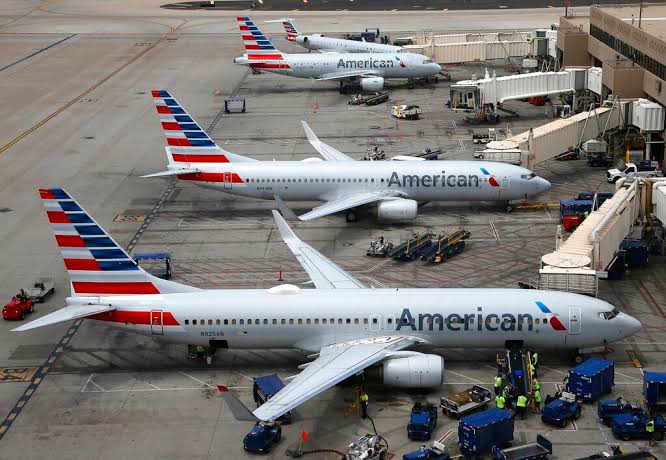“Passenger Brawl on American Airlines Flight Causes Emergency Landing”
The recent incident involving a passenger brawl on an American Airlines flight that led to an emergency landing highlights the growing concerns over in-flight safety and the rising number of unruly passenger cases. The incident underscores the challenges airlines face in maintaining order and ensuring the safety of all passengers and crew. Such situations not only disrupt the flight but also have broader implications for airline policies, passenger behavior, and the aviation industry as a whole.
Overview of the Incident
The incident occurred on an American Airlines flight en route from Los Angeles to Miami. Mid-flight, a violent altercation broke out between several passengers, forcing the pilots to divert the plane to a nearby airport for an emergency landing. According to reports, the fight began over a disagreement between two passengers, which quickly escalated into a physical brawl involving multiple individuals. The flight crew attempted to intervene and de-escalate the situation, but the confrontation became too intense to control.
Witnesses described the scene as chaotic, with passengers screaming and some even trying to separate the fighting individuals. The altercation resulted in injuries to several passengers, though none were life-threatening. The flight crew promptly notified the pilots, who decided to make an unscheduled landing at the nearest airport to ensure the safety of everyone on board. Upon landing, local law enforcement officers boarded the plane, and the involved passengers were removed and taken into custody for questioning.
Immediate Aftermath
The emergency landing caused significant delays, not only for the passengers on the affected flight but also for other flights at the diverted airport. Passengers were asked to remain seated during the police intervention, and the plane was grounded for several hours as authorities conducted an investigation. The airline provided compensation and rebooking options for the disrupted passengers, but many expressed frustration over the incident and the subsequent delays.
American Airlines issued a statement condemning the behavior of the passengers involved in the brawl. The airline emphasized its commitment to maintaining a safe and respectful environment for all passengers and reiterated that it has a zero-tolerance policy for any form of violence or disruptive behavior on its flights. The airline also confirmed that it would fully cooperate with law enforcement in the investigation and that the passengers involved in the altercation would likely face severe legal consequences.
The Rise of Unruly Passenger Incidents
The incident is part of a worrying trend in the airline industry: the increase in unruly passenger behavior. In recent years, airlines have reported a significant rise in the number of disruptive passengers, with incidents ranging from verbal altercations to physical violence. The Federal Aviation Administration (FAA) has documented a sharp increase in such cases, many of which are linked to disputes over mask mandates, alcohol consumption, and general frustration over travel conditions during the COVID-19 pandemic.
The pandemic has undoubtedly exacerbated tensions on flights, with many passengers feeling stressed, anxious, or irritable. The extended periods of waiting, coupled with the close quarters of airplane cabins, can lead to conflicts that quickly spiral out of control. Airlines have implemented various measures to address this issue, including banning alcohol sales on certain flights, enhancing crew training in conflict resolution, and increasing penalties for disruptive behavior.
Legal and Safety Implications
The legal implications for passengers involved in such incidents are serious. In the United States, interfering with a flight crew is a federal offense, punishable by heavy fines and imprisonment. Passengers who engage in violent behavior can face additional charges, including assault and endangerment of public safety. The passengers involved in the American Airlines brawl are likely to face such charges, with possible consequences including bans from future flights, legal prosecution, and civil lawsuits from other passengers.
From a safety perspective, in-flight altercations pose significant risks. When passengers become violent, they endanger not only themselves but also everyone else on board. Such incidents can distract the flight crew from their primary duties, potentially compromising the safety of the flight. In extreme cases, as seen in this incident, pilots may be forced to divert the plane, leading to emergency landings that carry their own risks.
Airlines’ Response to the Problem
To combat the rise of unruly passengers, airlines have been exploring various strategies. Enhanced screening procedures, stricter enforcement of in-flight rules, and improved crew training are some of the measures being adopted. Airlines are also working more closely with law enforcement to ensure that passengers who violate rules are held accountable.
One of the most notable responses has been the introduction of no-fly lists for disruptive passengers. Airlines, in coordination with federal authorities, have started placing individuals who engage in violent or aggressive behavior on these lists, barring them from flying with any U.S. carrier. This serves as a deterrent and ensures that repeat offenders are prevented from endangering others in the future.
Additionally, airlines have been advocating for stronger penalties against unruly passengers. The FAA has imposed hefty fines on individuals involved in such incidents, with some fines reaching up to $50,000. The agency has also adopted a zero-tolerance approach, bypassing warnings and directly pursuing enforcement action against offenders.
Broader Industry and Societal Impact
The increase in passenger brawls and other forms of disruptive behavior has broader implications for the aviation industry and society at large. For airlines, these incidents result in financial losses due to delays, diversions, and damage to property. Moreover, they tarnish the industry’s reputation and erode public confidence in air travel safety. For passengers, such incidents can be traumatic, creating fear and anxiety about future flights.
The societal impact is also significant. The rise in in-flight altercations reflects broader social tensions and declining standards of public behavior. Experts point to various factors contributing to this trend, including heightened political polarization, social media-fueled aggression, and the general stress of modern life. The anonymity and confinement of airplane cabins can exacerbate these tensions, leading to explosive situations.
Moving Forward: Addressing the Root Causes
To effectively address the problem of in-flight brawls and other forms of disruptive behavior, it is essential to look beyond immediate solutions and address the root causes. This includes better understanding the psychological and social factors that lead to such incidents. Airlines, regulators, and mental health experts must collaborate to develop comprehensive strategies that promote positive behavior and mitigate the triggers that lead to conflict.
Public awareness campaigns can also play a role. Educating passengers about the severe consequences of disruptive behavior and the importance of maintaining a calm demeanor during flights can help prevent incidents. Airlines could also offer incentives for positive behavior, such as rewards for passengers who assist in de-escalating situations or maintain composure during stressful events.
Finally, policy changes at the federal level could be necessary. Lawmakers could consider revising regulations to provide clearer guidelines on passenger conduct and to strengthen the penalties for those who violate these rules. Such measures would not only enhance safety but also reinforce the message that aggressive or violent behavior will not be tolerated.
The American Airlines incident, where a passenger brawl led to an emergency landing, serves as a stark reminder of the challenges airlines face in ensuring the safety and well-being of their passengers. While the rise in such incidents is concerning, it also presents an opportunity for the industry to implement meaningful changes. By addressing both the symptoms and the root causes of unruly behavior, airlines can create a safer and more pleasant travel experience for all passengers.




